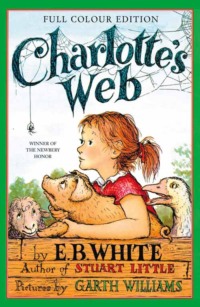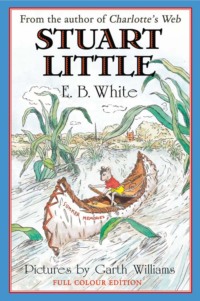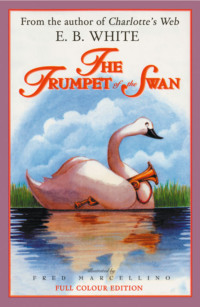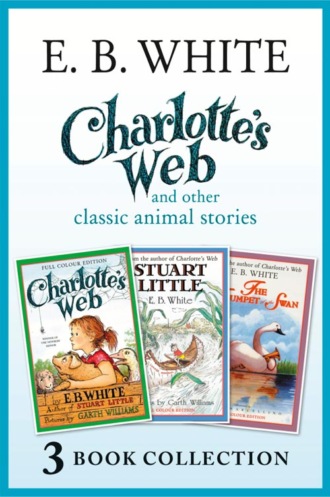
Полная версия
Charlotte’s Web and other classic animal stories: Charlotte’s Web, The Trumpet of the Swan, Stuart Little

E. B. WHITE
Charlotte’s Web and Other Classic Animal Stories
3-Book Collection

Copyright
This ebook collection first published in Great Britain by HarperCollins Children’s Books, 2015
HarperCollins Children’s Books A division of HarperCollinsPublishers Ltd 1 London Bridge Street London SE1 9GF
The HarperCollins Children’s Books website address is www.harpercollins.co.uk
Charlotte’s Web and other classic animal stories
Charlotte’s Web, first published as an ebook in Great Britain by HarperCollins Children’s Books, 2015.
Text copyright © E.B. White, 1952
Text copyright renewed © E.B. White, 1980
Illustration copyright © renewed 1980 by the Estate of Garth Williams
Colourisations copyright © 1999 by the Estate of Garth Williams
E.B. White and Garth Williams assert the moral right to be identified as the author and illustrator of this work.
Stuart Little, first published as an ebook in Great Britain by HarperCollins Children’s Books, 2015
Text copyright © E.B. White, 1945
Text copyright renewed © E.B. White, 1973
Illustration copyright renewed © Garth Williams, 1978
Colourisations copyright © 1999 by the Estate of Garth Williams
E.B. White and Garth Williams assert the moral right to be identified as the author and illustrator of this work.
The Trumpet of the Swan, first published as an ebook in Great Britain by HarperCollins Children’s Books, 2015
Text copyright © E.B. White, 1970
Illustration copyright © Fred Marcellino, 2000
E.B. White and Fred Marcellino assert the moral right to be identified as the author and illustrator of this work.
A catalogue record for this book is available from the British Library
All rights reserved under International and Pan-American Copyright Conventions. By payment of the required fees, you have been granted the non-exclusive, non-transferable right to access and read the text of this e-book on-screen. No part of this text may be reproduced, transmitted, down-loaded, decompiled, reverse engineered, or stored in or introduced into any information storage and retrieval system, in any form or by any means, whether electronic or mechanical, now known or hereinafter invented, without the express written permission of HarperCollins.
HarperCollinsPublishers has made every reasonable effort to ensure that any picture content and written content in this ebook has been included or removed in accordance with the contractual and technological constraints in operation at the time of publication.
Source ISBNs:
Charlotte’s Web: 9780008139414 Stuart Little: 9780008139421 The Trumpet of the Swan: 9780008139438 Ebook Edition © JULY 2015 ISBN: 9780008154530 Version: 2015-06-25
Contents
Cover
Title Page
Copyright
Charlotte's Web
Stuart Little
The Trumpet of the Swan
About the Author
About the Illustrators
About the Publisher
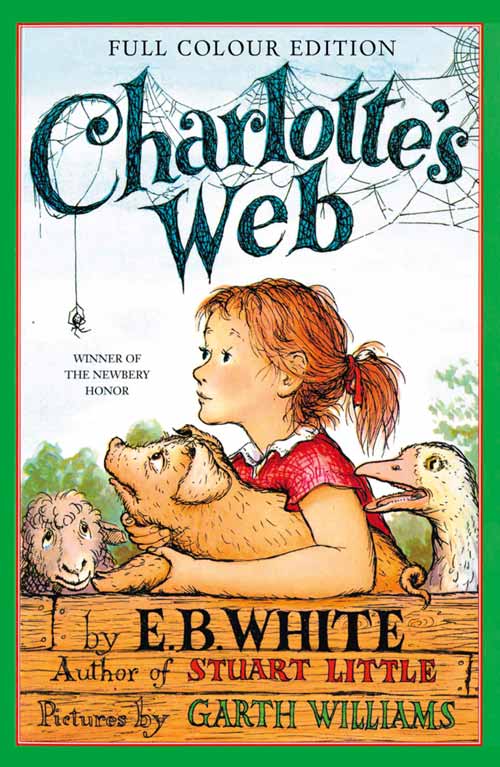
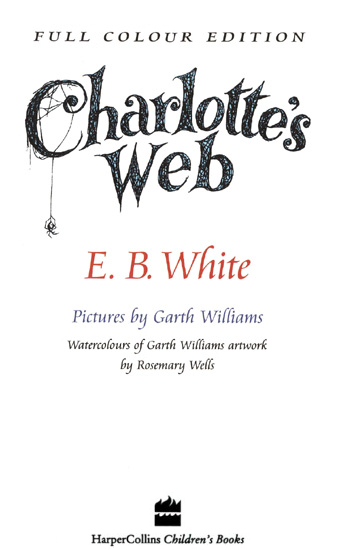
Contents
1. Before Breakfast
2. Wilbur
3. Escape
4. Loneliness
5. Charlotte
6. Summer Days
7. Bad News
8. A Talk at Home
9. Wilbur’s Boast
10. An Explosion
11. The Miracle
12. A Meeting
13. Good Progress
14. Dr Dorian
15. The Crickets
16. Off to the Fair
17. Uncle
18. The Cool of the Evening
19. The Egg Sac
20. The Hour of Triumph
21. Last Day
22. A Warm Wind
1. Before Breakfast
‘WHERE’S Papa going with that axe?’ said Fern to her mother as they were setting the table for breakfast.
‘Out to the hoghouse,’ replied Mrs Arable. ‘Some pigs were born last night.’
‘I don’t see why he needs an axe,’ continued Fern, who was only eight.
‘Well,’ said her mother, ‘one of the pigs is a runt. It’s very small and weak, and it will never amount to anything. So your father has decided to do away with it.’
‘Do away with it?’ shrieked Fern. ‘You mean kill it? Just because it’s smaller than the others?’
Mrs Arable put a pitcher of cream on the table. ‘Don’t yell, Fern!’ she said. ‘Your father is right. The pig would probably die anyway.’
Fern pushed a chair out of the way and ran outdoors. The grass was wet and the earth smelled of springtime. Fern’s sneakers were sopping by the time she caught up with her father.
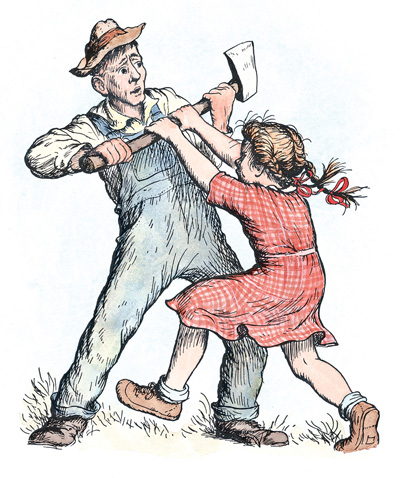
‘Please don’t kill it!’ she sobbed. ‘It’s unfair.’
Mr Arable stopped walking.
‘Fern,’ he said gently, ‘you will have to learn to control yourself.’
‘Control myself?’ yelled Fern. ‘This is a matter of life and death, and you talk about controlling myself.’ Tears ran down her cheeks and she took hold of the axe and tried to pull it out of her father’s hand.
‘Fern,’ said Mr Arable, ‘I know more about raising a litter of pigs than you do. A weakling makes trouble. Now run along!’
‘But it’s unfair,’ cried Fern. ‘The pig couldn’t help being born small, could it? If I had been very small at birth, would you have killed me?’
Mr Arable smiled. ‘Certainly not,’ he said, looking down at his daughter with love. ‘But this is different. A little girl is one thing, a little runty pig is another.’
‘I see no difference,’ replied Fern, still hanging on to the axe. ‘This is the most terrible case of injustice I ever heard of.’
A queer look came over John Arable’s face. He seemed almost ready to cry himself.
‘All right,’ he said. ‘You go back to the house and I will bring the runt when I come in. I’ll let you raise it on a bottle, like a baby. Then you’ll see what trouble a pig can be.’
When Mr Arable returned to the house half an hour later, he carried a carton under his arm. Fern was upstairs changing her sneakers. The kitchen table was set for breakfast, and the room smelt of coffee, bacon, damp plaster, and wood smoke from the stove.
‘Put it on her chair!’ said Mrs Arable. Mr Arable set the carton down at Fern’s place. Then he walked to the sink and washed his hands and dried them on the roller towel.
Fern came slowly down the stairs. Her eyes were red from crying. As she approached her chair, the carton wobbled, and there was a scratching noise. Fern looked at her father. Then she lifted the lid of the carton. There, inside, looking up at her, was the newborn pig. It was a white one. The morning light shone through its ears, turning them pink.
‘He’s yours,’ said Mr Arable. ‘Saved from an untimely death. And may the good Lord forgive me for this foolishness.’
Fern couldn’t take her eyes off the tiny pig. ‘Oh,’ she whispered. ‘Oh, look at him! He’s absolutely perfect.’
She closed the carton carefully. First she kissed her father, then she kissed her mother. Then she opened the lid again, lifted the pig out, and held it against her cheek. At this moment her brother Avery came into the room. Avery was ten. He was heavily armed – an air rifle in one hand, a wooden dagger in the other.
‘What’s that?’ he demanded. ‘What’s Fern got?’
‘She’s got a guest for breakfast,’ said Mrs Arable. ‘Wash your hands and face, Avery!’
‘Let’s see it!’ said Avery, setting his gun down. ‘You call that miserable thing a pig? That’s a fine specimen of a pig – it’s no bigger than a white rat.’
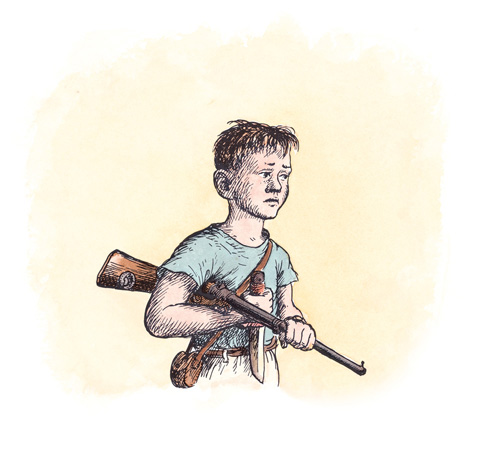
‘Wash up and eat your breakfast, Avery!’ said his mother. ‘The school bus will be along in half an hour.’
‘Can I have a pig too, Pop?’ asked Avery.
‘No, I only distribute pigs to early risers,’ said Mr Arable. ‘Fern was up at daylight, trying to rid the world of injustice. As a result, she now has a pig. A small one, to be sure, but nevertheless a pig. It just shows what can happen if a person gets out of bed promptly. Let’s eat!’
But Fern couldn’t eat until her pig had had a drink of milk. Mrs Arable found a baby’s nursing bottle and a rubber nipple. She poured warm milk into the bottle, fitted the nipple over the top, and handed it to Fern. ‘Give him his breakfast!’ she said.
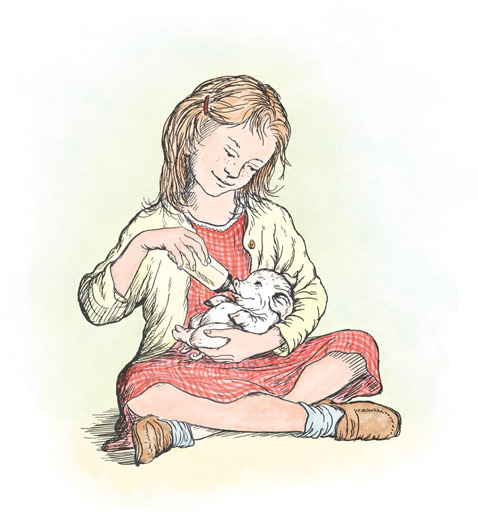
A minute later, Fern was seated on the floor in the corner of the kitchen with her infant between her knees, teaching it to suck from the bottle. The pig, although tiny, had a good appetite and caught on quickly.
The school bus honked from the road.
‘Run!’ commanded Mrs Arable, taking the pig from Fern and slipping a doughnut into her hand. Avery grabbed his gun and another doughnut.
The children ran out to the road and climbed into the bus. Fern took no notice of the others in the bus. She just sat and stared out of the window, thinking what a blissful world it was and how lucky she was to have entire charge of a pig. By the time the bus reached school, Fern had named her pet, selecting the most beautiful name she could think of.
‘Its name is Wilbur,’ she whispered to herself.
She was still thinking about the pig when the teacher said: ‘Fern, what is the capital of Pennsylvania?’
‘Wilbur,’ replied Fern, dreamily. The pupils giggled. Fern blushed.
2. Wilbur
FERN LOVED Wilbur more than anything. She loved to stroke him, to feed him, to put him to bed. Every morning, as soon as she got up, she warmed his milk, tied his bib on, and held the bottle for him. Every afternoon, when the school bus stopped in front of her house, she jumped out and ran to the kitchen to fix another bottle for him. She fed him again at suppertime, and again just before going to bed. Mrs Arable gave him a feeding around noontime each day, when Fern was away in school. Wilbur loved his milk, and he was never happier than when Fern was warming up a bottle for him. He would stand and gaze up at her with adoring eyes.
For the first few days of his life, Wilbur was allowed to live in a box near the stove in the kitchen. Then, when Mrs Arable complained, he was moved to a bigger box in the woodshed. At two weeks of age, he was moved outdoors. It was apple-blossom time, and the days were getting warmer. Mr Arable fixed a small yard specially for Wilbur under an apple tree, and gave him a large wooden box full of straw, with a doorway cut in it so he could walk in and out as he pleased.
‘Won’t he be cold at night?’ asked Fern.
‘No,’ said her father. ‘You watch and see what he does.’
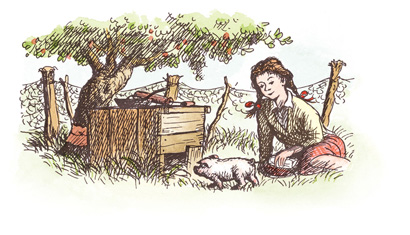
Carrying a bottle of milk, Fern sat down under the apple tree inside the yard. Wilbur ran to her and she held the bottle for him while he sucked. When he had finished the last drop, he grunted and walked sleepily into the box. Fern peered through the door. Wilbur was poking the straw with his snout. In a short time he had dug a tunnel in the straw. He crawled into the tunnel and disappeared from sight, completely covered with straw. Fern was enchanted. It relieved her mind to know that her baby would sleep covered up, and would stay warm.
Every morning after breakfast, Wilbur walked out to the road with Fern and waited with her till the bus came. She would wave goodbye to him, and he would stand and watch the bus until it vanished round a turn. While Fern was in school, Wilbur was shut up inside his yard. But as soon as she got home in the afternoon, she would take him out and he would follow her round the place. If she went into the house, Wilbur went too. If she went upstairs, Wilbur would wait at the bottom step until she came down again. If she took her doll for a walk in the doll carriage, Wilbur followed along. Sometimes, on these journeys, Wilbur would get tired, and Fern would pick him up and put him in the carriage alongside the doll. He liked this. And if he was very tired, he would close his eyes and go to sleep under the doll’s blanket. He looked cute when his eyes were closed, because his lashes were so long. The doll would close her eyes, too, and Fern would wheel the carriage very slowly and smoothly so as not to wake her infants.
One warm afternoon, Fern and Avery put on bathing suits and went down to the brook for a swim. Wilbur tagged along at Fern’s heels. When she waded into the brook, Wilbur waded in with her. He found the water quite cold – too cold for his liking. So while the children swam and played and splashed water at each other, Wilbur amused himself in the mud along the edge of the brook, where it was warm and moist and delightfully sticky and oozy.
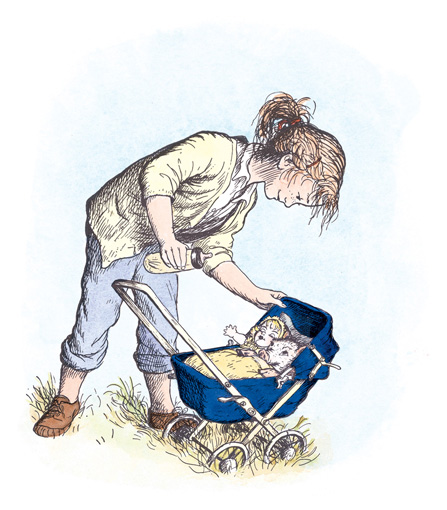
Every day was a happy day, and every night was peaceful.
Wilbur was what farmers call a spring pig, which simply means that he was born in springtime. When he was five weeks old, Mr Arable said he was now big enough to sell, and would have to be sold. Fern broke down and wept. But her father was firm about it. Wilbur’s appetite had increased; he was beginning to eat scraps of food in addition to milk. Mr Arable was not willing to provide for him any longer. He had already sold Wilbur’s ten brothers and sisters.
‘He’s got to go, Fern,’ he said. ‘You have had your fun raising a baby pig, but Wilbur is not a baby any longer and he has got to be sold.’
‘Call up the Zuckermans,’ suggested Mrs Arable to Fern. ‘Your Uncle Homer sometimes raises a pig. And if Wilbur goes there to live, you can walk down the road and visit him as often as you like.’
‘How much money should I ask for him?’ Fern wanted to know.
‘Well,’ said her father, ‘he’s a runt. Tell your Uncle Homer you’ve got a pig you’ll sell for six dollars, and see what he says.’
It was soon arranged. Fern phoned and got her Aunt Edith, and her Aunt Edith hollered for Uncle Homer and Uncle Homer came in from the barn and talked to Fern. When he heard that the price was only six dollars, he said he would buy the pig. Next day Wilbur was taken from his home under the apple tree and went to live in a manure pile in the cellar of Zuckerman’s barn.
3. Escape
THE BARN was very large. It was very old. It smelled of hay and it smelled of manure. It smelled of the perspiration of tired horses and the wonderful sweet breath of patient cows. It often had a sort of peaceful smell – as though nothing bad could happen ever again in the world. It smelled of grain and of harness dressing and of axle grease and of rubber boots and of new rope. And whenever the cat was given a fish-head to eat, the barn would smell of fish. But mostly it smelled of hay, for there was always hay in the great loft up overhead. And there was always hay being pitched down to the cows and the horses and the sheep.
The barn was pleasantly warm in winter when the animals spent most of their time indoors, and it was pleasantly cool in summer when the big doors stood wide open to the breeze. The barn had stalls on the main floor for the work horses, tie-ups on the main floor for the cows, a sheepfold down below for the sheep, a pigpen down below for Wilbur, and it was full of all sorts of things that you find in barns: ladders, grindstones, pitchforks, monkey wrenches, scythes, lawn mowers, snow shovels, axe handles, milk pails, water buckets, empty grain sacks, and rusty rat traps. It was the kind of barn that swallows like to build their nests in. It was the kind of barn that children like to play in. And the whole thing was owned by Fern’s uncle, Mr Homer L. Zuckerman.
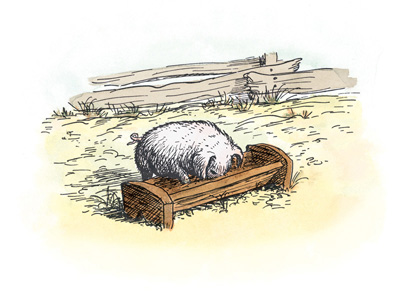
Wilbur’s new home was in the lower part of the barn, directly underneath the cows. Mr Zuckerman knew that a manure pile is a good place to keep a young pig. Pigs needed warmth, and it was warm and comfortable down there in the barn cellar on the south side.
Fern came, almost every day, to visit him. She found an old milking stool that had been discarded, and she placed the stool in the sheepfold next to Wilbur’s pen. Here she sat quietly during the long afternoons, thinking and listening and watching Wilbur. The sheep soon got to know her and trust her. So did the geese, who lived with the sheep. All the animals trusted her, she was so quiet and friendly. Mr Zuckerman did not allow her to take Wilbur out, and he did not allow her to get into the pigpen. But he told Fern that she could sit on the stool and watch Wilbur as long as she wanted to. It made her happy just to be near the pig, and it made Wilbur happy to know that she was sitting there, right outside his pen. But he never had any fun – no walks, no rides, no swims.
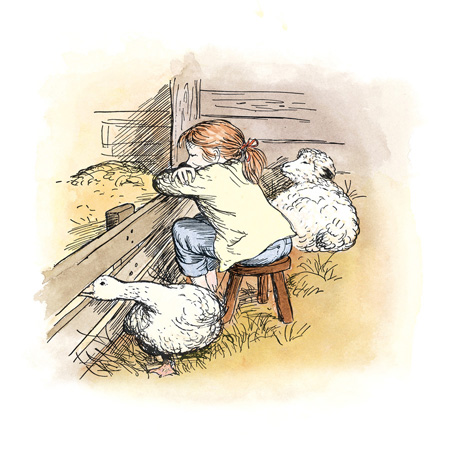
One afternoon in June, when Wilbur was almost two months old, he wandered out into his small yard outside the barn. Fern had not arrived for her usual visit. Wilbur stood in the sun feeling lonely and bored.
‘There’s never anything to do round here,’ he thought. He walked slowly to his food trough and sniffed to see if anything had been overlooked at lunch. He found a small strip of potato skin and ate it. His back itched, so he leaned against the fence and rubbed against the boards. When he tired of this, he walked indoors, climbed to the top of the manure pile, and sat down. He didn’t feel like going to sleep, he didn’t feel like digging, he was tired of standing still, tired of lying down. ‘I’m less than two months old and I’m tired of living,’ he said. He walked out to the yard again.
‘When I’m out here,’ he said, ‘there’s no place to go but in. When I’m indoors, there’s no place to go but out in the yard.’
‘That’s where you’re wrong, my friend, my friend,’ said a voice.
Wilbur looked through the fence and saw the goose standing there.
‘You don’t have to stay in that dirty-little dirty-little dirty-little yard,’ said the goose, who talked rather fast. ‘One of the boards is loose. Push on it, push-push-push on it, and come on out!’
‘What?’ said Wilbur. ‘Say it slower!’
‘At-at-at, at the risk of repeating myself,’ said the goose, ‘I suggest that you come on out. It’s wonderful out here.’
‘Did you say a board was loose?’
‘That I did, that I did,’ said the goose.
Wilbur walked up to the fence and saw that the goose was right – one board was loose. He put his head down, shut his eyes, and pushed. The board gave way. In a minute he had squeezed through the fence and was standing in the long grass outside his yard. The goose chuckled.
‘How does it feel to be free?’ she asked.
‘I like it,’ said Wilbur. ‘That is, I guess I like it.’ Actually, Wilbur felt queer to be outside his fence, with nothing between him and the big world.
‘Where do you think I’d better go?’
‘Anywhere you like, anywhere you like,’ said the goose. ‘Go down through the orchard, root up the sod! Go down through the garden, dig up the radishes! Root up everything! Eat grass! Look for corn! Look for oats! Run all over! Skip and dance, jump and prance! Go down through the orchard and stroll in the woods! The world is a wonderful place when you’re young.’
‘I can see that,’ replied Wilbur. He gave a jump in the air, twirled, ran a few steps, stopped, looked all round, sniffed the smells of afternoon, and then set off walking down through the orchard. Pausing in the shade of an apple tree, he put his strong snout into the ground and began pushing, digging, and rooting. He felt very happy. He had ploughed up quite a piece of ground before anyone noticed him. Mrs Zuckerman was the first to see him. She saw him from the kitchen window, and she immediately shouted for the men.
‘Ho-mer!’ she cried. ‘Pig’s out! Lurvy! Pig’s out! Homer! Lurvy! Pig’s out. He’s down there under that apple tree.’
‘Now the trouble starts,’ thought Wilbur. ‘Now I’ll catch it.’
The goose heard the racket and she, too, started hollering. ‘Run-run-run downhill, make for the woods, the woods!’ she shouted to Wilbur. ‘They’ll never-never-never catch you in the woods.’
The cocker spaniel heard the commotion and he ran out from the barn to join in the chase. Mr Zuckerman heard, and he came out of the machine shed where he was mending a tool. Lurvy, the hired man, heard the noise and came up from the asparagus patch where he was pulling weeds. Everybody walked towards Wilbur and Wilbur didn’t know what to do. The woods seemed a long way off, and anyway, he had never been down there in the woods and wasn’t sure he would like it.
‘Get round behind him, Lurvy,’ said Mr Zuckerman, ‘and drive him towards the barn! And take it easy – don’t rush him! I’ll go and get a bucket of slops.’
The news of Wilbur’s escape spread rapidly among the animals on the place. Whenever any creature broke loose on Zuckerman’s farm, the event was of great interest to the others. The goose shouted to the nearest cow that Wilbur was free, and soon all the cows knew. Then one of the cows told one of the sheep, and soon all the sheep knew. The lambs learned about it from their mothers. The horses, in their stalls in the barn, pricked up their ears when they heard the goose hollering; and soon the horses had caught on to what was happening. ‘Wilbur’s out,’ they said. Every animal stirred its head and became excited to know that one of its friends had got free and was no longer penned up or tied fast.
Wilbur didn’t know what to do or which way to run. It seemed as though everybody was after him. ‘If this is what it’s like to be free,’ he thought, ‘I believe I’d rather be penned up in my own yard.’
The cocker spaniel was sneaking up on him from one side, Lurvy the hired man was sneaking up on him from the other side. Mrs Zuckerman stood ready to head him off if he started for the garden, and now Mr Zuckerman was coming down towards him carrying a pail. ‘This is really awful,’ thought Wilbur. ‘Why doesn’t Fern come?’ He began to cry.
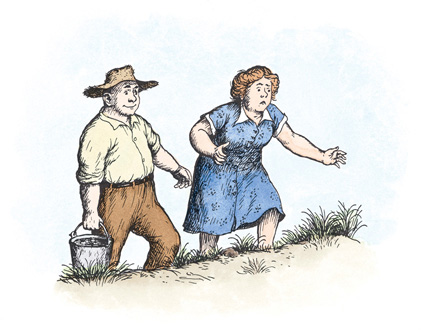
The goose took command and began to give orders.
‘Don’t just stand there, Wilbur! Dodge about, dodge about!’ cried the goose. ‘Skip around, run towards me, slip in and out, in and out, in and out! Make for the woods! Twist and turn!’


